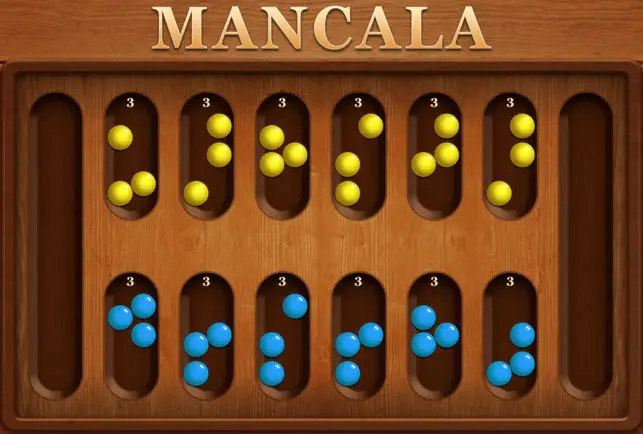
Mancala is, in every sense, a game of pure skill and strategy. Each sowing must be calculated in terms Of how it affects your ability to capture the stones in your opponent's cups and in terms of how it affects your opponent's ability to capture the stones in your pits.
Flight

Flight is a relatively simple move used to defend your stones from capture. If you determine that your opponent is in a position to capture the stones in one of your cups, you can prevent capture simply by emptying that cup and sowing. the stones.
This way, if your opponent proceeds with the intended move, his sowing will end in an empty cup and he will capture no stones.
Threat
The Threat tactic is a more offensive strategy that can be used to fend off a possible attack from your opponent.
In this scenario, you may wish to set up a counter-attack which would pose an immediate threat to the stones in your opponent's cups, forcing him to make a defensive play rather than attacking you.

The 3 green stones of player 1 are in danger and he should move the two red stones to create a threat on the opponent's side because his two blue stones in the first pit can attack them in the next turn.
Overkill

Overkill involves defending your threatened pit by altering your opponent's sowing position. In this case, you can choose a pit from which to sow which will result in an extra stone being added to your opponent's cup which threatens your stones.
With the extra stone, a sowing from your opponent's threatening pit will overshoot your vulnerable cup.
Reinforcement
Reinforcement involves a more indirect defensive play by making a threatened pit ineligible for capture.
Hoarding

We talk about hoarding if a player allows stones to accumulate in a certain pit and refusing to play that pit. The pit serves this way as a "virtual mancala".
The player must try to avoid playing from that pit, so its contents are swept to the mancala at the end of the game. But beware, it's a tempting bait for your opponent.
Looping
Do this strategy when a considerable booty is involved. You go all the way around the board to raid stones from an opponent's pit which is too far to the left to be accessed without the loop. There is usually an overhead cost of 5 pits involved in a loop, as one populates the opponent's side on the way around.
Looping is an effective ambush strategy in a game where the opponent is not keeping careful count of the stones. The pit fills easily to the point that stones can't be counted by mere inspection. You have the advantage of a surprise attack when you know that the number of stones has reached the target for making a successful raid.
Raiding

You capture a pit of the opponent's stones by placing the last stone in an empty bin on your own side, directly across from the opponent's bin being raided.
Sacrificing
Sacrificing is giving up stones for a greater net gain or lower net loss and can be good baiting strategy.
Rookies often avoid being raided at all costs, but a careful player will count the cost of being raided (or of giving up stones by playing around to the other side of the board) and weigh the cost against alternatives or simultaneous benefits because the cost of an avoided raid can be higher.
Rushing
Go quickly out of stones on your own side of the board. If you plan carefully a long sequence of moves, it's sometimes possible to do this in one turn (depending on the board setup).
Stalling
Here we do the opposite of rushing and is a companion strategy to starving. Stalling does not necessarily avoid putting stones on the other player's side. Both strategies can be used in conjunction with one another for the best outcome.
Starving

You refuse to repopulate the opponent's side with stones carried around beyond ones own Mancala. This is a great strategy when one has enough stones on one's own side of the board to win the game and can force the opponent to go out quickly.
Be careful to count correctly that you can outlast your opponent. Watch your stones on your own side of the board as your opponent might capture them in the process of going out.
Stuffing
Here we do the opposite of starving to defend against being rushed and raided.
Avoid Excessive Buildup
Try to keep the number of stones in each bin less than or equal to the number needed to hit my own mancala. This maintains the option of starving the opponent and it allows more often for compound turns, which build up the mancala quickly. It gives great flexibility in building a setup within a single turn.
Interacting Strategies
Many strategies interact with each other, or can be shifted from one to another as the unfolding game demands: e.g., Hoarding is powerful when it can be pulled off effectively, but is very difficult to maintain through the end of the game.
Hoarding buys an option on looping but can be switched to a stuffing strategy if necessary.
Timing
The timing of your strategies and tactics is essential. A good player can watch for opportune times to unload too-full holes or can weigh that factor when deciding whether to unwind a hoarding strategy. This also reduces the overhead cost of a looping maneuver.
Continue Reading


